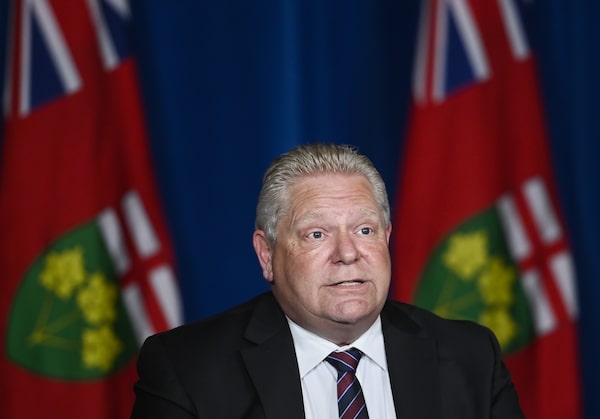This month an Ontario judge did what judges are meant to do when faced with a challenge to government legislation. He reviewed arguments that were put before him. He studied what other courts have ruled in the past. He looked at what the Constitution says. Then he handed down his judgment. Justice Edward Morgan of the Ontario Superior Court struck down the changes to the Election Finances Act proposed by Ontario’s Progressive Conservative government.
Doug Ford did not like that. He did not like that one little bit. In the political equivalent of a toddler’s screaming fit, the Ontario Premier decided that, first, he would invoke the notwithstanding clause of the Constitution to overrule the judge and, second, he would recall the legislature to ram the changes through.
Both steps are extraordinary in the circumstances. Governments usually call legislators back from a recess only for urgent matters such as ending a crippling strike. This was not remotely in that category. The government was seeking to extend pre-election restrictions on third-party advertising, broadening the period when spending is restricted to 12 months instead of six. Not exactly a provincial emergency, and hardly a reason to march legislators back into the House for an overnight weekend sitting.

Ontario Premier Doug Ford holds a press conference in Toronto on May 20, 2021.Nathan Denette/The Canadian Press
Using the notwithstanding clause is rightly called the nuclear option. This misfit child of the agreement to patriate Canada’s Constitution in 1982 permits governments to exempt themselves from parts of the new Charter of Rights and Freedoms if they so choose. Because that means overriding some of the most fundamental rights enjoyed by Canadians, most are reluctant to use it. The federal government has never invoked the clause. Nor has Ontario before this, though it came close in 2018.
When governments do pull the trigger, it is generally to defend legislation that, correctly or not, they consider to be of such profound importance that it justifies brushing aside the courts and playing a rare Get Out of Jail Free card. Quebec has used it to defend its language laws, which its government considers crucial to the province’s cultural health. Again, a six-month extension to an election-spending law is not remotely in the same category – though the Ford government is striving mightily to convince voters that it is.
The party’s House Leader, Paul Calandra, said it was only trying to protect Ontario voters from American-style “big-money political influence.” The judge’s ruling, he said, “means a few wealthy elites, corporations and special interest groups operating through American-style Super PACs would be allowed to interfere in and control our elections with unlimited money, with no rules, no disclosure and with no accountability.”
In fact, the judge was quite sympathetic to the government’s attempt to control money politics. All he said was that if the government wanted to compromise free expression by applying spending restrictions – not just for the election campaign period or for the existing six months, remember, but for a full year before an election – it had better have a good explanation. He found it had presented no such thing.
Mr. Ford does not seem to have much time for hair-splitting judges. Shortly after becoming Premier, he moved to push through legislation cutting the size of Toronto city council in half, something he had thirsted to do since serving on it with his brother, former mayor Rob Ford. When a judge’s ruling (later overturned) threatened to stand in his way, he said: “He’s the judge, I’m the Premier.” And if a judge could cancel an elected government’s decisions, “That’s scary, that’s disturbing.”
No, it’s constitutional democracy. In our system, imperfect as it is, even elected majority governments can’t simply do as they please. The courts are there to make sure that when politicians make laws, they respect the rights of citizens as set out in the country’s ultimate law – its constitution.
So Justice Morgan was simply doing his job when – calmly, moderately, methodically – he reviewed the government’s legislation and ruled that it fell short. Mr. Ford could have expressed his disagreement by appealing to a higher court. Instead, he reached for the nuclear button.
After three years in office, and years more at the city level, Ontario’s Premier still doesn’t seem to accept the concept of limited, accountable government.
Our Morning Update and Evening Update newsletters are written by Globe editors, giving you a concise summary of the day’s most important headlines. Sign up today.
 Marcus Gee
Marcus Gee